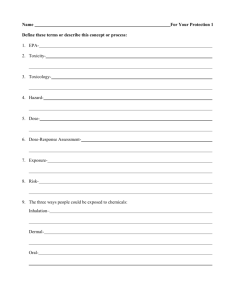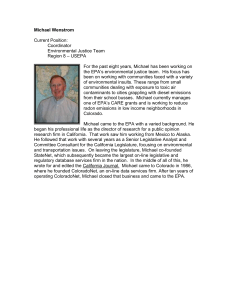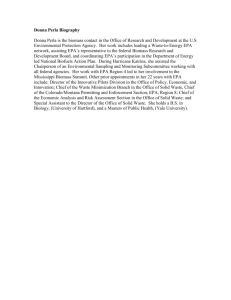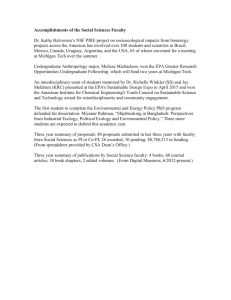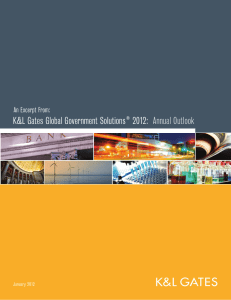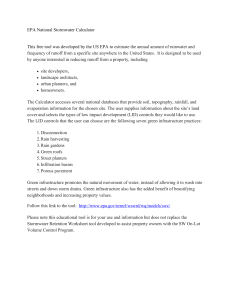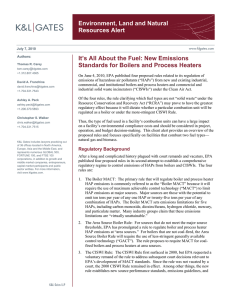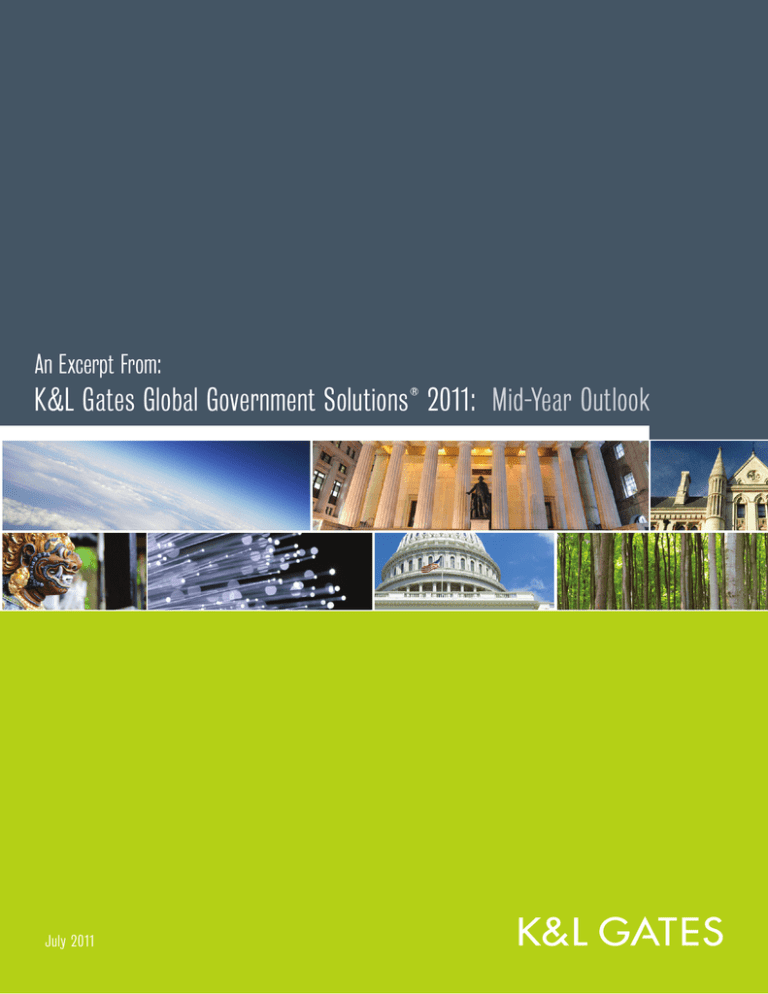
An Excerpt From:
K&L Gates Global Government Solutions ® 2011: Mid-Year Outlook
July 2011
Energy and Environment
Environmental Policy—One Year Later
A little more than year ago, the U.S. Congress was seriously considering cap and
trade legislation. That was before the mid-term election resulted in the election of
87 freshman Republicans. Now, six months into the 112th Congress and sixteen
months before the presidential election, with the prospects for cap and trade
legislation long gone, the debate has shifted from legislation to regulations.
This year, the U.S. Environmental
Protection Agency (“EPA”) has
aggressively moved forward on its
regulatory agenda to control greenhouse
gas emissions and hazardous and
conventional air pollutants from utilities,
power plants, and other sources. EPA
actions include:
• Implementation of the greenhouse gas
tailoring rule and guidance, which
require permits and best available
control technology to reduce greenhouse
gas emissions from large sources;
• F inal cement, utility, and boiler rules
requiring maximum achievable control
technology (“MACT”) to control
hazardous air pollutants;
• P roposed guidance that expands
federal jurisdiction and the number
of water bodies subject to the Clean
Water Act.
• F inal commercial and industrial solid
waste incinerator (“CISWI”) and
non-hazardous secondary materials
(“NHSM”) rules that define tires, wood
debris, and other biomass as a waste
rather than fuel, and subject units
burning these newly defined wastes to
stringent incinerator standards;
EPA also is beginning to consider
effluent limits and discharge standards
for waste water from hydraulic fracturing
operations. The common thread in
most of these rulemakings is to tighten
emissions standards and discharge
limits on carbon-based industry sectors
including coal, chemical, oil and gas,
utilities, and mining.
• P roposed coal ash regulations that may
define ash as hazardous; and
•A
proposed Clean Water Act section
316(b) cooling water rule that controls
water intake used to cool utility plants;
26
K&L Gates Global Government Solutions ® 2011 Mid-Year Outlook
Outlook
Most of these actions have generated
considerable opposition in Congress and
from many outside groups, resulting in
legal and legislative setbacks for EPA and
in regulatory uncertainty.
On the legal front, many of EPA’s recent
actions, including the MACT and
greenhouse gas permitting rules, are
being challenged. Several groups have
filed petitions challenging EPA over its
greenhouse gas tailoring rule and over its
utility, boiler, CISWI, and NHSM rules.
As more EPA rules advance, there will
undoubtedly be more litigation.
On the legislative front, EPA has been
subject to unprecedented funding cuts
and oversight. The House initially passed
legislation that would have cut EPA’s
budget by $3 billion, but Congress
settled on a cut of about $1.6 billion,
reducing the agency’s budget to $8.7
billion. More significant cuts are likely,
including possible personnel reductions
once Congress takes up EPA’s 2012
budget later this summer.
Energy and Environment
EPA’s regulatory agenda has been under
the Congressional microscope, primarily
regarding its potential economic impact.
EPA Administrator Lisa Jackson has
been a frequent guest of House Energy
and Commerce committee chairman
Fred Upton (R-MI), House Oversight
and Government Reform committee
chairman Darrell Issa (R-CA), and
House Appropriations subcommittee
chairman Mike Simpson (R-ID), appearing
before Congress more than any other
cabinet official during the first session
of the 112th Congress. With so many
controversial EPA rules still pending and
with the election nearing, Administrator
Jackson will almost certainly be asked
to spend even more time on Capitol Hill
throughout the summer and fall.
of the coal ash regulation until after the
election, and proposing cost-effective
options that utilities can use for meeting
cooling water intake requirements.
Cliff L. Rothenstein (Washington, D.C.)
cliff.rothenstein@klgates.com
The situation remains unsettled. This creates
uncertainty, but it also provides companies
an opportunity for some regulatory relief.
With the election just around the corner and
the economy a major issue, the window
will be wide open for the next few months
for those who want to make their case for
further regulatory flexibility. This opportunity
may be especially welcome to biomass
companies, utilities, natural gas developers,
coal producers, and others who are
potentially affected by EPA regulations
and policies and who may want to seek
additional regulatory changes.
Cindy L. O’Malley (Washington, D.C.)
cindy.omalley@klgates.com
Michael W. Evans (Washington, D.C.)
michael.evans@klgates.com
William H. Hyatt, Jr. (Newark)
william.hyatt@klgates.com
All of this attention on EPA is starting to
have an impact. The White House is
now more closely reading the election
tea leaves, and EPA is beginning to show
some flexibility, such as issuing a 3-year
waiver from greenhouse gas permitting
requirements for facilities using certain
biomass, agreeing to reconsider the boiler
MACT and CISWI rules and stay the
effective date of these rules until after they
are reconsidered, delaying the issuance
K&L Gates Global Government Solutions ® 2011 Mid-Year Outlook
27
Anchorage Austin Beijing Berlin Boston Brussels Charlotte Chicago Dallas Doha Dubai Fort Worth Frankfurt Harrisburg Hong Kong
London Los Angeles Miami Moscow Newark New York Orange County Palo Alto Paris Pittsburgh Portland Raleigh Research Triangle Park
San Diego San Francisco Seattle Shanghai Singapore Spokane/Coeur d’Alene Taipei Tokyo Warsaw Washington, D.C.
K&L Gates includes lawyers practicing out of 38 offices located in North America, Europe, Asia and the Middle
East, and represents numerous GLOBAL 500, FORTUNE 100, and FTSE 100 corporations, in addition to growth
and middle market companies, entrepreneurs, capital market participants and public sector entities. For more
information about K&L Gates or its locations and registrations, visit www.klgates.com.
This publication is for informational purposes and does not contain or convey legal advice. The information herein should not be used or relied upon in regard to
any particular facts or circumstances without first consulting a lawyer.
©2011 K&L Gates LLP. All Rights Reserved.


